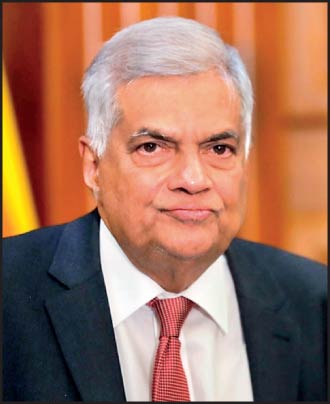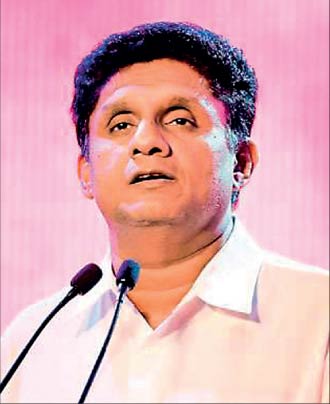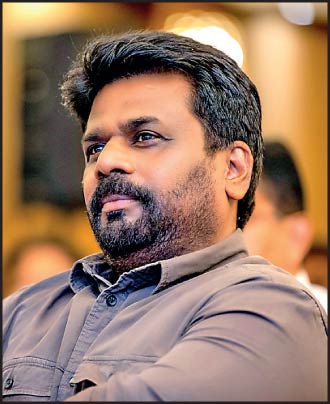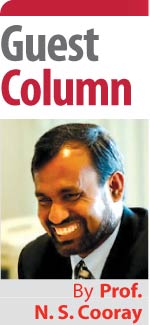Wednesday Feb 25, 2026
Wednesday Feb 25, 2026
Thursday, 14 March 2024 00:25 - - {{hitsCtrl.values.hits}}

Ranil Wickremesinghe

Sajith Premadasa

Anura Kumara Dissanayake
|
 Background
Background
This year (2024) is the ultimate election year because over 60 countries will hold elections, a record. Sri Lanka could be more exceptional as we will go to the presidential election, having postponed many other subnational-level elections. By early 2022, Sri Lanka had spiralled into an unprecedented economic crisis since independence. In a very short period, the crisis has generated far-reaching consequences beyond the economic sphere into the political and social sphere. Citizens are waiting for a leader to bring the country back to normal and take it to the next level of well-being by changing corrupt politicians and ill-conceived policies. Given this background, this short essay will share some lessons Sri Lanka can learn from the best practices of the rest of the world.
Lessons from the top four economies in the world
The four prosperous economies of Europe, North America, and Asia have attained high levels of material well-being compared to many other nations; this should be known to Sri Lanka’s authorities. The political-economic systems used by the top four global economies—the US, China, Japan, and Germany—to attain material well-being differ. These include the Japanese developmental state, market-oriented capitalism in America, Chinese-style capitalism in China, and a social market economy in Germany.
Despite much criticism about global capitalism by right-wing and left-wing populists, most political and economic scholars and policymakers do not deny that capitalism has created prosperity. The top countries mentioned above provide classic empirical evidence to prove that. Those countries have implemented capitalist policies with necessary modifications according to the resource endowment and cultural and historical background of those countries. While capitalism is accused of inequality and climate change problems, capitalism or the free market mechanism still plays a vital role in bringing well-being to citizens. The number one economy, the United States of America, implements market-oriented capitalism. The United States is predicted to have the largest economy in 2023, with a projected GDP of $26.9 trillion. This exceeds the total GDP of 174 nations, ranked from Tuvalu (191st) to Indonesia (17th), and 25.54% of global production. It boasts a robust private sector driving innovation and wealth creation. The number two economy, China, operates in quasi-capitalism with Chinese characteristics. China’s economy surged closer to America, achieving a nominal gross domestic product of $19.4 trillion- more than 72% of the U.S. GDP in 2023. The elimination of poverty is a remarkable achievement. China’s National People’s Congress approved a long-term strategy covering 15 years. According to that, China wants to replace the U.S. as the world’s largest economy by the end of 2035. In China, state ownership of key sectors alongside significant private enterprise and foreign investment played an important role in strategic industries and economic policies to steer growth and maintain stability. Japan, the third-largest economy with a GDP of $4.4 trillion in 2023, implemented the Japanese System of Developmental Capitalism with decisive Government intervention in economic planning and regulation. It features a robust industrial sector dominated by large corporations, often working closely with the Government to achieve economic goals. Germany has Europe’s most prominent national economy and the fourth largest globally, behind the U.S., China, and Japan, with a GDP of about US$4.3 trillion. Germany functions under a social market economy, linking elements of capitalism with a welfare state. It emphasises social welfare, collective bargaining, and a highly skilled workforce, with the Government playing a significant role in supporting and regulating the economy to ensure stability and social cohesion.
The examination of the prosperous economies of the four countries (perhaps except China) reveals that modern economies were made possible by inclusive political, economic, and social institutions, including the open democratic process, appropriate Government intervention, and the rule of law. Free to enter and depart, private property rights, easily accessible information and money, inexpensive transaction costs, efficient allocation of input resources, trustworthy contract enforcement, open and competitive marketplaces—a culture of individual liberty where health and education are valued and easily accessible which have contributed for the progress.
Sri Lanka has established the Social Market Economy but needs market orientation and social responsibility
The coalition Government took office in 2015 to eradicate corruption and bring development, democracy, good governance, and healing to the nation. The Government chose the Social Market Economy (SME) tenets to accomplish those objectives. The SME seeks to encourage fairness and free entrepreneurship in the private sector through Government action while fostering economic competition. Germany›s economic model is based on the SME, balancing social concerns and market efficiency. It represents classical liberalism, emphasising a free market and a welfare-oriented state. Germany emphasises the values of domestic harmony and the concerns of the community. During the post-war era, the German federal Government and individual Lander (states) Governments formed a steady and favourable atmosphere for private enterprise. In the 1970s, the SME scheme generated the post-war economic miracle.
The foundational concepts of the SME framework were created in Freiburg, Germany, throughout the 1930s and 1940s. The German version of social liberalism, ordoliberalism, strongly focuses on the Government›s need to ensure that the free market generates outcomes nearly in line with theory. Ordoliberals contend that Adam Smith›s observation that the market is ingrained in legal and political institutions was overlooked by nineteenth- and twentieth-century «laissez-faire» politicians, who were responsible for liberalism›s shortcomings. They genuinely think it is crucial to defend individual freedom and human dignity.
Unfortunately, despite promises made by the political authorities of Sri Lanka, SMEs could not achieve the efficiency of free markets with a commitment to social welfare. They emphasised the importance of market competition and private enterprise for economic growth while also recognising the need for social responsibility and intervention to ensure fairness, equity, and the protection of vulnerable individuals and groups. However, policy goals are yet to be achieved for the reasons discussed in the next section.
With constitutive and regulating principles, the Social Market Economy will enhance the well-being of Sri Lankans
According to the author’s understanding, the selection of SMEs for Sri Lanka is commendable. To get the full potential of SMEs, Germany employed proper economic and institutional mechanisms labelled as “principles” by the Ordoliberals. Eucken (1952) illustrated two kinds of principles: “constitutive” principles and “regulating” principles. The constitutive principles should safeguard a workable competition-based economic direction while harmonising regulating principles was supposed to sustain the humane aspect of the economic order.
The constitutive principles establish the fundamental values and objectives, emphasising the integration of market dynamics with social welfare goals. According to Eucken (1952), constitutive principles include monetary stability, competency and liability, flexible prices on competitive markets, private property rights, freedom of contract, and steadiness of economic policymaking. These constitutive principles collectively define a social market economy’s underlying values, objectives, and mechanism, providing a framework for balancing economic dynamism with social cohesion and well-being. The regulating principles include a redistribution policy (with an incentive-compatible tax system), an anti-trust policy, a social security/conducive working environment, and rewards for market failure.
These regulating principles work together to create a framework that promotes economic prosperity, social equity, and environmental sustainability within a social market economy. By balancing market forces with Government intervention, SMEs aim to achieve inclusive and sustainable growth that benefits all members of society. Together, these regulating and constitutive principles form the foundation of an SME, striving to achieve a harmonious balance between economic prosperity, social equity, and environmental sustainability. Future leaders and policymakers of Sri Lanka must earnestly consider these principles to cultivate a society characterised by contentment and harmony.
Sri Lanka needs modernisation while preserving tradition
There are many lessons Sri Lanka can learn from Japan. One such lesson is modernisation while preserving culture and tradition. Japan emerged as the first Asian country to achieve developed status and become the second-largest global economy despite devastation during World War II. After the Meiji Restoration in 1868, Japan’s modernisation process stimulated remarkable development across various sectors. The rigid class system was eventually eliminated during the Meiji Restoration, and a more democratic and free Government was established, allowing the Japanese people to realise their full potential. The Meiji Restoration brought about greater democracy and freedom. With this new democratic regime, Japan quickly modernised and advanced. The Meiji Government attempted to catch up with the West. Japan implements the Japanese System of Developmental State as the political economy model. In this model, the state was crucial in directing incentives through a unique policy-making process, utilising natural resources, and collective economic and human growth. Japan also maintained a delicate balance between economic advancement and cultural preservation, and its approach is a compelling model for Sri Lanka. Embracing innovation while harnessing its lush cultural inheritance, Sri Lanka can navigate modernisation in a manner that not only preserves its glorious history but also drives the nation toward greater prosperity.
In conclusion, Sri Lanka needs to be a modern nation that still preserves its Sri Lankan culture and identity. The importance of individual liberty lies at the heart of SME and classical liberalism’s political theory. The recent Government interventions gravely threaten this liberty. For this reason, the rule of law should always serve as a constraint on governments. Creating a business environment conducive to producers and consumers, protecting people’s rights, and insulating them from outside pressure should be the primary responsibility of the Government.
(The author is a professor at the Graduate School of International Relations of the International University of Japan and the President of the Association of Sri Lanka Academics in Japan.)